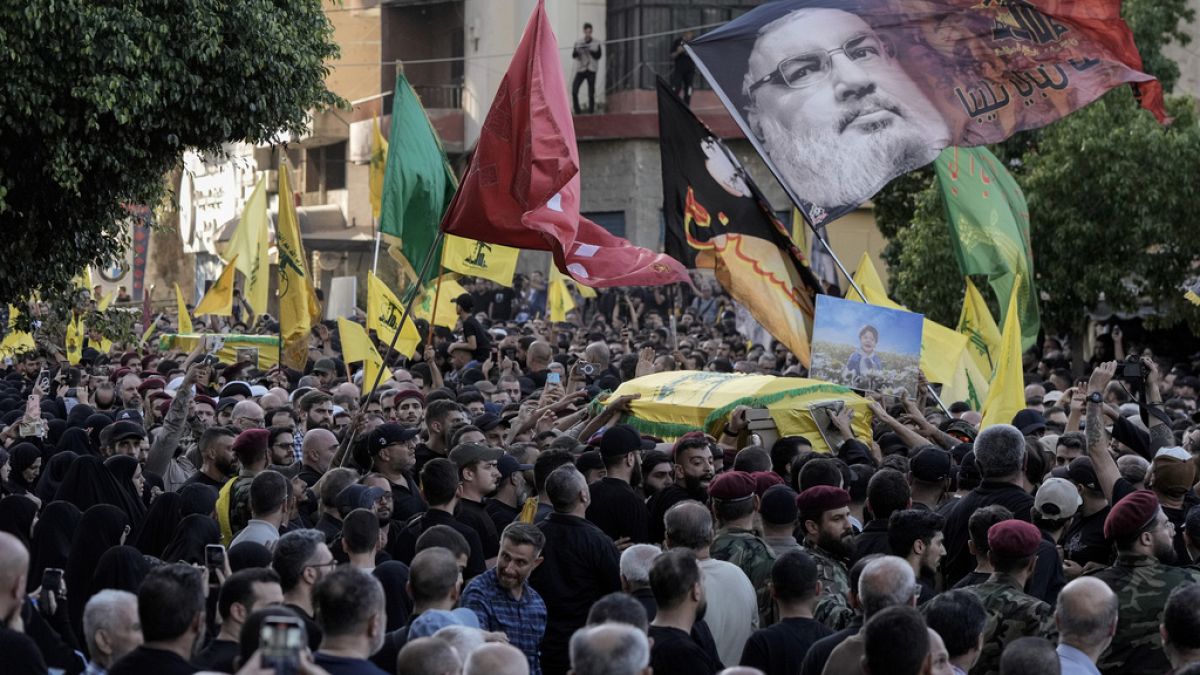Independent foreign policy analyst Adnan Nasser told Euronews that the war is a question of “scale and degree”.
This week saw a significant spike in tensions between Israel and the Lebanese militant group Hezbollah, with both sides exchanging heavy fire following a wave of pager explosions in Beirut last Tuesday.
However, no one is calling the conflic a “war” just yet. Israeli officials maintain they are not seeking war with Hezbollah and are encouraging the group to halt its attacks and back away from the border.
Hezbollah, for its part, has said it does not want a war but is prepared for one — and refused to cease its attacks until there is a cease-fire between Israel and Hamas in Gaza.
Independent foreign policy analyst Adnan Nasser told Euronews that Hezbollah was engaged in a “limited war” with Israel since the attacks on 7 October, which sparked the war between Israel and Hamas.
Recent escalations, however, stand to violate the “rules of engagement” that previously characterised tensions between Israel and Hezbollah, Nasser said.
“The war has included multiple fronts. It’s a question of scale and degree. Do we want to see all these other fronts, Lebanon, Yemen risk looking like Gaza after almost a year of being bombarded by the Israeli military?” he asked.
Although Israeli strikes have killed more than 180 people, Andreas Krieg, a military analyst at King’s College London, says the term hasn’t yet been applied as there “haven’t been any boots on the ground”.
What might a full-scale war look like?
Experts previously generally agreed that any future war between Israel and Hezbollah would look like the war they fought in 2006 — but much, much worse.
For years, Israel’s idea of a future war with Lebanon became known as the “Daniyeh Doctrine,” with officials warning that the army would punish parts of Lebanon itself to flatten Hezbollah strongholds.
Hezbollah, meanwhile, spent years expanding and improving its arsenal and is believed to have some 150,000 rockets and missiles capable of hitting all parts of Israel.
The military build-up and threats created a situation of mutual deterrence that kept the border largely quiet from 2006 until October of last year. For most of the past year, the region has been braced for the worst, but both sides have shown restraint, and the talk of “all-out war” has been hypothetical.
Recent tensions, however, threaten to upend this situation.
“We’ve gone up a step, but we haven’t yet made it to the penthouse floor,” said Uzi Rabi, the director of the Moshe Dayan Center for Middle Eastern and African Studies at Tel Aviv University. “At the end, I don’t see there’s going to be any alternative to a ground operation.”
Would boots on the ground make it a war?
Any Israeli decision to send tanks and troops into southern Lebanon would lead many to characterise the conflict as a war. However, the two don’t necessarily always go hand in hand.
Although Israel officially declared war in Gaza nearly three weeks before it sent any ground troops in, Israeli ground forces have been operating in the occupied West Bank for decades without anyone suggesting the incursion constituted a war.
In a similar vein, Russia sent its forces to illegally annex Ukraine in 2014; however, only when Moscow declared a full-scale invasion of the country in early 2022 was the conflict internationally referred to as a war.
A limited Israeli ground incursion might still leave room for both sides to back down.
Lebanon would likely see a ground invasion as a blatant violation of its sovereignty and an act of war. However, Beirut has already accused Israel of violating its airspace and occupying disputed territory along the border.
On paper, the two countries have been officially in a state of war since 1948.
Read the full article here
